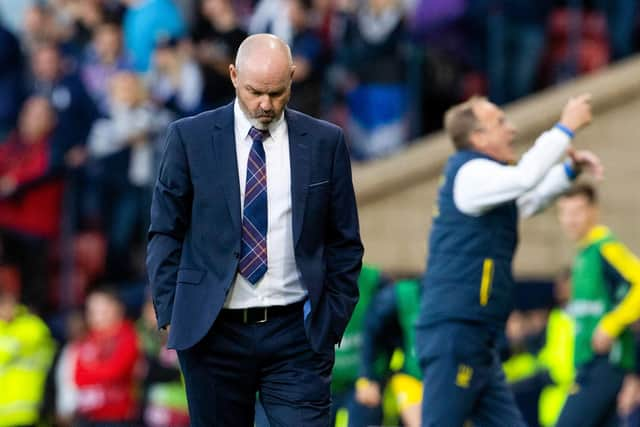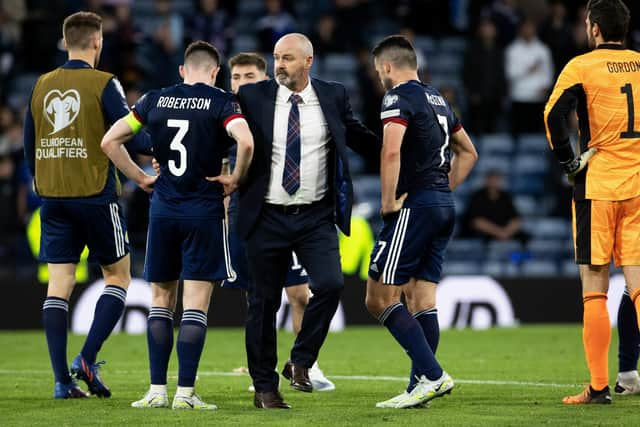Steve Clarke defends his Scotland tactics and insists he won't 'throw the baby out with the bath water'
Rather than return to their Edinburgh base, Steve Clarke’s side stayed the night at a hotel on the outskirts of Glasgow after the 3-1 loss to Ukraine on Wednesday night.
The players were exhausted, drained. Some, such as Craig Gordon, who turns 40 later this year, had to process the likelihood that their World Cup ambitions were now over. It was the comedown of all comedowns. All had to accept and respect the depth of suffering involved. It was a process that had to be endured.
Advertisement
Hide AdAdvertisement
Hide Ad“We went back to Dakota (hotel), which is a bit closer,” revealed Clarke. “We sat down, we all had dinner, a bite to eat together. On a night like the other night, there is not much chat. Some will go to their beds, some won’t. We let them sulk in their own way, whatever they wanted to do.”
This is the first time Clarke has spoken in any real depth about the defeat since Wednesday. It had all proved too raw, too painful in the direct aftermath of the match that ended another World Cup dream. He has even postponed the Ukraine debrief with his players until today.
Perhaps wisely, Clarke has decided against employing Gordon Strachan’s heavily derided theory when Scotland last exited the same competition. It wasn’t about genes. It was mostly down to Scotland not playing well enough on the night. Although it isn't certain the Tartan Army will accept this explanation either.
It’s now three years since Clarke’s debut match as Scotland manager – the third anniversary falls on Wednesday, when Scotland kick-off their second Nations League campaign against Armenia. With 17 victories in 35 matches, and two draws and a loss in his last three outings, the manager’s win rate has dropped below 50 per cent again.


Clarke can discern a sudden dip in enthusiasm levels within the Tartan Army but he is confident they will get behind the team again.
He underlined what a good start to their second Nations League campaign could lead to – a play-off place for Euro 2024. Winning the group would also mean the chance to play Pot One teams. As shown last midweek, Scotland must find a way of overcoming higher standard teams. Indeed, two further clashes with Ukraine loom as soon as September.
It’s hard not to dwell on what might have been on the day many Scots were anticipating a British derby shootout against Wales for a place at the World Cup finals.
“It’s not quite as exciting as playing against Ukraine in a World Cup play-off but it’s a very important game for us now,” Clarke stressed.


Advertisement
Hide AdAdvertisement
Hide AdBut he also knows it’s not what people are talking about at bars around Scotland. Even now, five days later, the post-mortem is continuing. Why did Clarke not change things even earlier than half-time, when he replaced Ryan Christie with Lyndon Dykes? Why did he start with two strikers? Why was Scott McTominay in defence? Where was John McGinn meant to be playing?
“I obviously have some ideas of where it went wrong on the night,” said Clarke. “People will throw different things around. Tactical, mental, preparation-wise… all those things are out there. But it’s probably a combination of things. We certainly didn’t play as well as we could on the night.
“I went over what we tried to do at half-time and how it didn’t work,” he added. “It didn’t work for us because we conceded such an early goal in the second half. From there, we tried to get back in the game but it was frantic. We recognise all that. You want to pick the bones out of it but we have to move on.”
Not yet Steve, not yet. Questioned about the three-at-the-back system, and whether Kieran Tierney’s absence ought to make it redundant, Clarke launched a passionate case for its retention. “I think it has served us well with or without Kieran in it. And we have played other games without Kieran in it.
“Rather than throwing the baby out with the bath water why not analyse and look at it and say can we find a better way to play that system.”
As for playing two strikers, he argued, not unreasonably, that this was what everyone was urging him to do 12 months ago following a misfiring start against Czech Republic at Euro 2020. “No one questioned the two up front against Austria away or England at Wembley,” he pointed out.
He has faith in the fans and believes they still have faith in him and his team. Clarke sensed their restlessness on Wednesday. He heard some booing.
"Quite early in the game," he noted. "I noticed that but with raised expectations come bigger expectations. We understand that."
Advertisement
Hide AdAdvertisement
Hide AdHe referenced his first match in charge, against Cyprus, when only 30,000 were there, and another clash, again early in his tenure, when Scotland, who were trailing 1-0 at half-time against Kazakhstan, were booed off by the 19,500 home supporters.
“So the fans are back onside, they will be disappointed but we need them to stick with us because we did this campaign together,” he said.
“Think back to Israel at home, the 3-2 game which was a massive result in the process to get there. There were still 50,000 in the stadium when we took that last corner. That was important.
“Then we played Denmark, we had a full house to help and inspire the lads. That was important.
“We need the crowd. We have got them back onside and we need them to stay onside. Our performances on the park will dictate that but in the short term we need the crowd. We need them next game.”
Comments
Want to join the conversation? Please or to comment on this article.